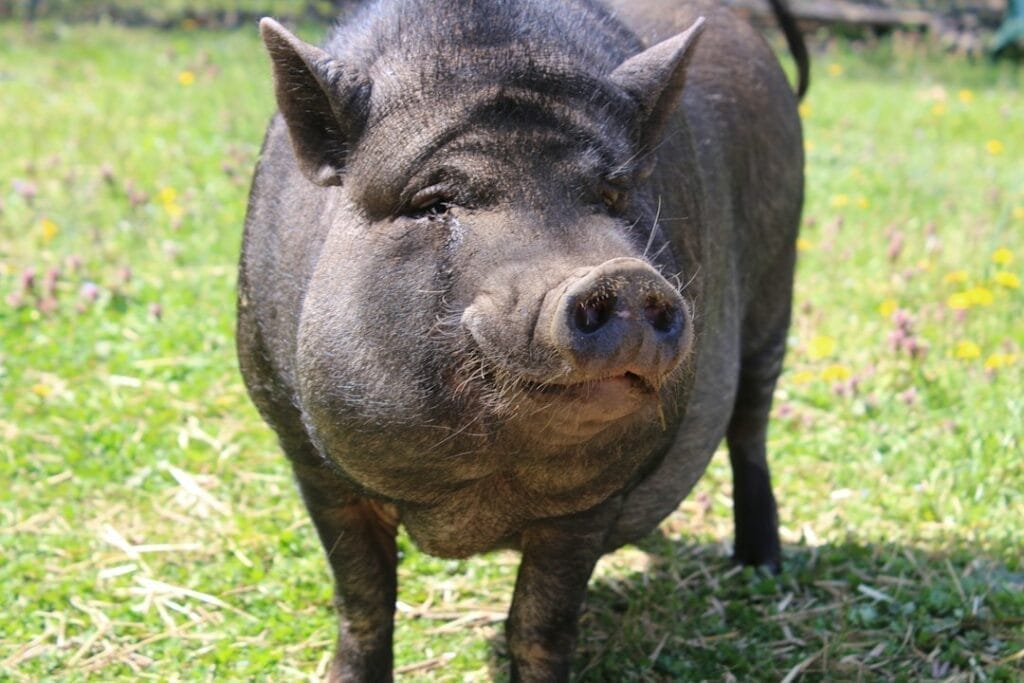Envision transforming your living space into a sanctuary for a pet pig, immersing yourself in the nuances of their distinctive lifestyle. This journey starts with understanding the special habitat needs that keep them healthy and happy. Guiding you step-by-step, we’ll help craft an ideal environment and select optimal bedding materials, among other essentials.
But what about their diet? Get ready to learn exactly what to feed your porcine friends to ensure they thrive.
We also tackle common health issues head-on, offering tips on regular vet care and how to spot signs of trouble early. And let’s be real—owning a pet pig comes with its own set of challenges and rewards. We’ll give you an honest look at both so you can decide if it’s right for you.
Last but not least, we share insights on training and socializing these intelligent creatures. Far from being mere animals kept at home, they weave themselves into the very fabric of our households, becoming irreplaceable members of our family circle.
Table Of Contents:
- Pet Pig Varieties
- Understanding the Unique Habitat Needs of Pet Pigs
- The Ideal Diet for a Healthy Pet Pig
- Recognizing and Addressing Common Health Issues in Pet Pigs
- Pros and Cons of Owning a Pet Pig
- Training and Socializing Your Pet Pig
- Porky as a Pet?
 AI illustration of a pet mini pig
AI illustration of a pet mini pig
Pet Pig Varieties
When considering adding a pet pig to your family, it’s important to understand the different breeds available and their unique needs. Pet pigs come in various sizes, colors, and personalities, making them an intriguing option for animal lovers. However, before adopting one of these intelligent creatures into your home, familiarize yourself with common species considered pets rather than farm animals.
Popular Pet Pig Breeds
- Potbellied Pigs: Known for their manageable size and friendly disposition, they are among the most common pet pig varieties. They can weigh between 100-200 pounds as adults.
- Miniature Pigs: Including the Juliana and KuneKune breeds, miniature pigs are cherished for their small stature (typically under 100 pounds) and docile nature.
- Texas Miniature Pigs: This breed is known for its smaller size than other miniatures. They’re highly sociable animals that thrive on interaction with humans.
Differences among these breeds often lie in size, temperament, and care requirements; thus,, selecting a breed that matches your lifestyle is crucial. Consult reputable sources for more detailed information on each breed’s specific care needs.
Navigating Legal Responsibilities
Owning a pet pig involves specific responsibilities beyond basic care—particularly regarding legality, which varies significantly by location. To ensure compliance:
- Contact local zoning offices: Confirm if keeping a pet pig is allowed in your area.
- Licensing Requirements: Some regions require you to own a license similar to those needed for exotic animals – check out ASPCA’s guidelines here.
- Veterinary Care: Ensure access to veterinarians knowledgeable about swine health issues.
Note: Failure to comply may result in fines or having your beloved pet taken away. Before bringing any porky friend into your home, make sure all legal bases are covered!
Understanding the Unique Habitat Needs of Pet Pigs
Pet pigs aren’t just adorable; they have specific needs that make them quite unique as house pets. Unlike cats or dogs, pigs require a habitat that closely mimics their natural environment to stay happy and healthy.
Space Needs
A common misconception is that pet pigs need less space because they’re smaller than farm pigs. This couldn’t be further from the truth. Even mini pig breeds love to roam, forage, and play, requiring ample outdoor space to engage in these natural behaviors. A securely fenced yard lets your pig enjoy the outdoors safely and helps prevent unwanted escapes.
Inside your home, dedicated pig-proof areas are crucial. Pigs are curious by nature and will explore everything with their snouts. Ensure indoor spaces are free of small objects that could be swallowed and potentially hazardous materials.
Bedding Preferences
Comfort is key when it comes to bedding for pet pigs. Pigs delight in nestling into cushy spots and might relish the added coziness of blankets or pet-specific cushions. PetPigWorld’s guide on pig bedding can provide more information. Straw or hay can also be used, but ensure it’s changed regularly to keep their sleeping area clean and dry.
The Ideal Diet for a Healthy Pet Pig
Feeding your pet pig correctly is like hitting the jackpot in a health slot machine. Providing a well-rounded diet is key to ensuring your pig stays joyful, fit, and free from prevalent problems such as obesity.
Commercial Pig Feeds: The Foundation
Picking the right commercial pig feed isn’t just about grabbing anything off the shelf. Look for feeds specifically formulated for pet pigs or mini pigs. Formulated feeds cater to the distinct dietary requirements of pigs, ensuring they get all necessary nutrients without an excess intake of calories.
But don’t just take my word for it; research backs this up. According to experts, feeding guidelines from reputable sources can help you dial in the perfect amount.
Fresh Foods: The Cherry on Top
Besides commercial feeds, fresh fruits and vegetables should be part of your pig’s diet, but think of them as treats rather than main courses. Veggies like carrots, cucumbers, and leafy greens are great options that most pigs love.
Adding these items to their feed enriches their nutritional intake and brings a bit of joy to their dining experience. Remember, though, moderation is key because too much of a good thing can lead to dietary imbalances.
Recognizing and Addressing Common Health Issues in Pet Pigs
Having a pet pig can fill your home with happiness, yet they also introduce their unique health hurdles that need attention. Being aware of potential health problems is key to ensuring your pig pal stays in tip-top shape.
Obesity: A Weighty Issue
Pigs have a hearty appetite, yet indulging them too much might cause their weight to balloon, straining their cardiovascular and skeletal systems. Ensure you’re sticking to a diet recommended by experts, which usually includes commercially available pig feed supplemented with fresh vegetables.
If your pig starts looking more round than robust, it might be time to cut back on the treats and increase exercise—yes, pigs need exercise, too. Consider creating an obstacle course in your yard or taking daily walks if space allows.
Skin Conditions: More Than Just Mud Baths
Beyond rolling in mud—which actually helps protect their skin from sunburn and parasites—pet pigs are prone to various skin conditions such as mange mites or fungal infections. Regular vet check-ups are crucial because early detection makes treatment much simpler.
You should also provide plenty of shade and clean bedding since dirty environments can exacerbate skin problems. For more detailed guidance on managing these issues effectively, visit the Texas A&M Veterinary Medicine & Biomedical Sciences page.
If you have questions about the health of your bearded dragon, you can sign up for an online vet consultation with Ask A Veterinarian. They are available 24/7 to answer questions.
To avoid unexpected health costs, check out Pet Assure Mint.
Pros and Cons of Owning a Pet Pig
Owning a pet pig is like having a toddler with hooves. They’re intelligent, social creatures but come with their own set of challenges.
The Bright Side: Pros of Having a Pet Pig
Pigs are whip-smart animals. Teaching them tricks or house rules can be easier than you think because they love to learn and please their owners. Forming deep connections with their human families, they provide a bounty of joy and companionship over the years. Their cleanliness might surprise you; pigs prefer to keep their living areas neat when given the chance.
The Flip Side: Cons You Should Consider
But it’s not all belly rubs and snout kisses. Pigs need lots of space– indoors and outdoors to roam, forage, and be pigs. Without proper stimulation, they can turn your backyard into a moonscape or your living room into chaos central in no time flat. And let’s talk about vet care; finding one specializing in swine can be tricky.
Training and Socializing Your Pet Pig
Pigs are smart. Their brilliance shines through in such a way that teaching them becomes not only feasible but also quite fun. However, their intelligence means they can easily get bored, so variety is your best friend.
Start with basic commands like ‘sit’ and ‘stay’. Treats work wonders as motivation—think of small food rewards that don’t contribute to obesity. Keeping a regular schedule is crucial because pigs really benefit from having a steady routine.
Mingling is pivotal in nurturing pigs, ensuring they develop properly and maintain their well-being. These social creatures need interaction to stay happy and healthy. Introduce them early to family members, including other pets if you have any, ensuring positive and controlled interactions.
Porky as a Pet?
So, you’ve dived into the world of owning a pet pig. You’ve learned about their need for space and the right bedding to keep them comfy.
You’ve mastered selecting nourishment that ensures your pig flourishes, mixing store-bought chow with natural snacks.
Spotting health issues early is key; regular vet visits are non-negotiable. But it’s not all challenges—these intelligent creatures bring joy and companionship into your life.
Training and socializing them ensures they’re more than pets; they’re family members who understand rules and form deep bonds.
If you remember nothing else, remember this: Caring for a pet pig takes commitment but offers unmatched rewards. Dive in with knowledge, patience, and love.


